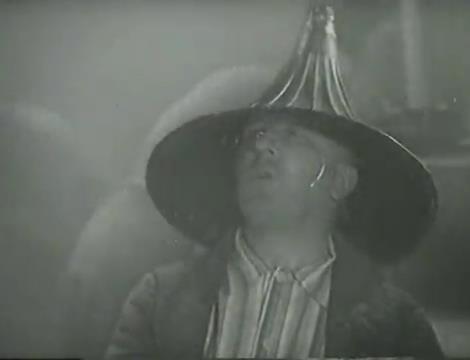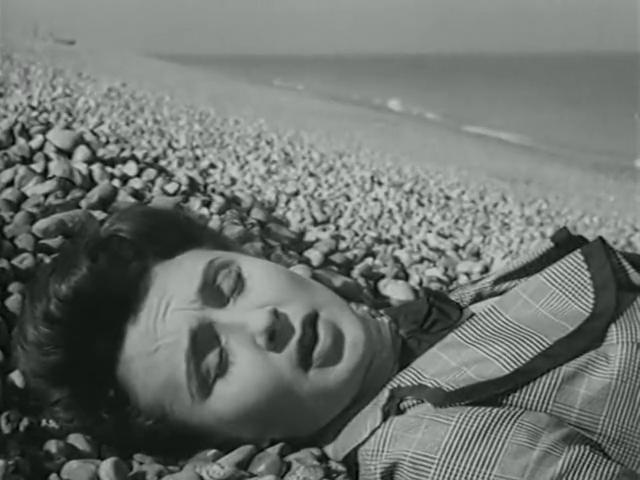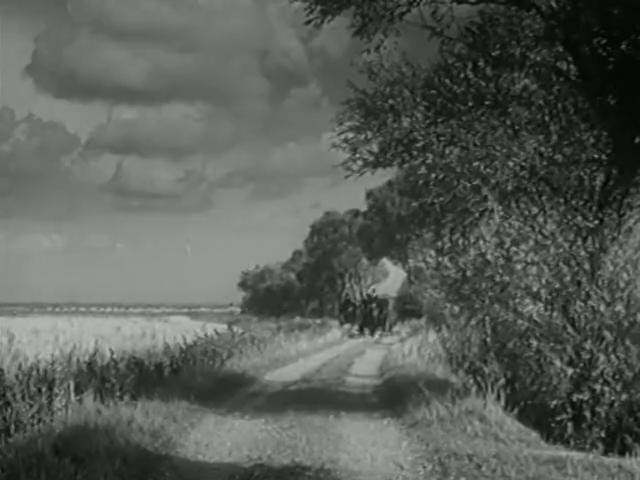The Big
Blockade

The Ministry for
Economic Warfare, “Britain’s fourth arm.” A film of perfect
candor. “You violate me under international law!”
“I
wouldn’t dream of it, Captain.” Very rapid strides.
“I mean the
real Roman Empire.” Facts and
dramatizations, “reports”.
“We’re
not studying history, we’re making it. Ha-ha!
Ha-ha-ha-ha-ha-ha-ha-ha-ha-ha-ha...”
Ersatz.
“Take my trousers.”
“I beg your pardon?”
Tom Milne (Time Out), “strictly a museum piece.” Film4, “the message is put across well
enough, but it's now worth watching for its well-cast roles and some
efficiently executed action sequences.”
Radio Times, “embarrassing
caricatures”. TV Guide, “the production values
of this grinder are low and the direction is flat.”
Hal Erickson (Rovi), “quickly fell out of favor once
it served its wartime purpose.” Halliwell’s Film Guide,
“curious”, citing Kine Weekly rather less insensibly. George Perry (Forever Ealing), “heavily propagandist and didactic in
tone.”
Producers Balcon and Cavalcanti, cinematographer Cooper, camera Slocombe, editors Crichton and Bennett, special effects Kellino, score Addinsell,
screenplay MacPhail.
“The Navy
cert system.” The Non-Aggression Pact. “The vicious intrigues of
the capitalist Jewish British Empire have been banished forever. Ah! How are
the mighty fallen.”
“Pardon,
isn’t that quotation from a well-known capitalist Jewish
publication?”
“The Bible.
So it is. Please accept my apologies!” The Nazi propaganda effort,
“a typical German newsreel.” The Battle of the Atlantic,
“just as tough for the Germans... tougher every day.”
“You’re
telling me, tovarich.”
Invasion of Russia, Pearl Harbor, “the vermin of Vichy.” From start
to finish, a bombing raid on Hanover. “Well, if the factory is destroyed, we cannot be blamed for the deficiency in our output, can we?”
St. George and
the Dragon. Well before “the end of the beginning”, the Siege of
Europe.
The Foreman Went to France
From England, on
June 12th, 1940, to retrieve defense machinery before the Germans
reached the factory.
Refugees choke
the road, part of the German plan, and they are strafed. French Fascists are at
every turn, local officials, a phony British officer.
The blitzkrieg is moving very fast.
The sole
initiative of the hero gets him to France, two British soldiers and an American
secretary help him back to the coast.
The New York
Times reviewer thought it old hat and very good when it premiered in the
U.S.A. a year late.
San Demetrio London
The wreck of the San
Demetrio averted by fate in a convoy out of
Galveston bound for the Clyde with oil.
Richard Brooks’ Lord Jim and Huston’s Beat the Devil have the gross chance of
encountering the vessel after abandoning ship, on the Atlantic in winter here
subsequent to an attack on the convoy by German surface vessels.
The ravaged ship
is afire but seaworthy, and thus begins a tale of seamanship justly honored at
the inquest, for the tale is all true.
Variety was full of proper admiration and amazement,
George Perry in Forever Ealing follows the BFI in his derelict comment, Time
Out Film Guide is distinctly neutral, Halliwell describes a “rather
flat and dated propaganda piece, which seemed much more vivid at the
time.”
The Loves of Joanna
Godden

An anagrammatic
analysis of Far from the Madding Crowd
(dir. John Schlesinger) showing the expedients of a woman who does not know her
own mind, the innovations and susceptibility to notions, a major study on that
score as well as of Romney Marsh and Dungeness (cinematography Douglas Slocombe), “lonely now, but lonelier still in
1905.”
H.E. Bates and
Angus MacPhail translate the novel,
Vaughan Williams makes this the occasion of a further study in its own right.
Variety,
“the picture falls short
of its intentions.” TV Guide, “the photography is the
only high point of the picture, and is also responsible for much of the
film’s dragginess. The filmmakers put forth too
much effort in displaying the scenery, taking away from the development of the
story.” Halliwell’s Film
Guide, “dullish”.
Michael Balcon, Ealing.

Scott of the Antarctic
The determining
point of style is dramatic understatement. This was thought by Variety
to have been a miscalculation.
The expedition is
delayed by lack of Treasury support, it is granted in lesser measure than
anticipated at last, Scott and his men depart not so
well-supplied as he had hoped.
Frend delineates
the circumstances of the exploit by establishing the southernmost continent
from the sea and then cutting to the frozen water that covers it, adding a bit
of low mist off the ice. The heroism of these Christian gentlemen and scholars,
tars and Tommies, remains unflappable throughout an
eighteen-hundred-mile trek to the Pole, and even unto death.
It may be
imagined that the filmmakers were concerned that some of the events might seem
too dramatic, but that is a risk absorbed by the account and the style, the one
a matter of public record and the other a means of representing such men, as
well as their “wives and sweethearts”.
The very reserve
that is shown in the telling is a large part of what Kubrick amassed from the
film for 2001: A Space Odyssey, along with the departure of the Terra
Nova, Scott saying “tell him I’ll bring him a penguin,” a
sequence of Antarctic views conveying the strangeness of that “awful
place”, and the acerbic poesy of the superimposed titles in the latter
part, “The Polar Night”, “The Return of the Sun”.
Conclusions may
be drawn about the expedition, as here, and they are principally those of Scott
in his journal.
A Run for Your Money
After Scott of
the Antarctic, Frend films a proper there-and-back on two Cambrians in
London.
There’s the
bardic laws, and the sacred symbol, and Wales vs.
England at Twickenham, courtesy of the Weekly Echo
(circulation millions), and the buying of a diamond ring.
Polanski (Two
Men and a Wardrobe) for the Eisteddfod winners about town with two hats and
a harp, also Hitchcock (The Man Who Knew Too Much, second version) for
the harp protected from a dustup.
Bosley Crowther (New
York Times) was genuinely appreciative, on the same day he chucked
Renoir’s Rules of the Game out altogether. George Perry (Forever
Ealing) is all wet, well-provided with company, though (Halliwell’s
Film Guide, Time Out Film Guide).
The Magnet
An encomium of
the invisible watch that tells the correct time only the wearer knows, he swaps
it for the irresistible present of a magnet capable of picking up sand pails on
the beach. This handy little item is briefly suborned by a hoodlum to the uses
of a pinball machine illicitly, but then is donated as the widow-boy’s
mite toward the propagation of an iron lung for the local hospital.
The inventor at a
beauty pageant hawks the tale of such benevolence and generosity, the Lord
Mayor bids at auction and throws back the bait for further sales,
he buys the magnet yet again after more bidding at another charity auction.
The donor is a
wee tyke just getting over the scarlet fever, an
overheard conversation gives him to understand he’s murdered the
magnet-owner with his lingering germs, though it’s a parakeet
that’s dead of natural causes.
Fleeing the
charge, he’s shielded from a copper by guttersnipes he’s impressed,
the tall leader dares him across a beam, but falls himself face-down in the
surf. Rescue comes, the boy having descended to await it beside the bully, a new iron lung saves the victim’s life.
A civic honor is bestowed, the hero swaps it for his invisible watch back.
One of the
greatest Ealing films (or British or Continental) is abstruse and comic in
exceedingly fine degrees, therefore it is not admired and never was, consequently it remains little-known. Frend & Clarke
have contrived to match the superb screenplay with perfectly unexampled views
of the seaside town filled with a constant stream of gags and satire, nothing
like it before French Dressing.
The Cruel Sea
A history of the
war as fought by amateurs led into it by the occasion.
Mostly raw
sailors and officers commanded by a merchant captain, on convoy escort duty.
All the stages
and minutest degrees of this are expressed in many details,
the drama is the making of a ship’s crew.
The New York
Times’ A.W. couldn’t see any drama in it whatsoever, and couldn’t
fathom the title.
Ambler’s
screenplay covers all the bases and expresses everything, Frend’s
direction is equally proficient, the acting misses
nothing.
Lease of Life
This is closely
related and practically identical to Hamer’s Pink String and Sealing
Wax on a country vicar so blithe he teaches Sunday School on “Suffer
the little children...”
A school
chaplaincy depends (without his knowing it) on a cathedral sermon, his
daughter’s up for a piano scholarship at the London School of Music.
An old farmer is dying, the wife and the hired man are scheming for his
money.
The vicar finds
that he himself has only a year to live.
The daughter is
the only hope from a worthless life, says the vicar’s wife.
A man so modest,
and rightly so if you prefer, finds his way out of the tangles by writing a
regular column in the Sunday Gazette to support the daughter, his
cathedral sermon having made headlines for preaching against a headmaster-god
and living negatively, by rules.
Frend, Ambler and
Donat convey the man’s anguish at the thought
of death, like Maté’s D.O.A. ŕ l’anglaise,
and Donat’s performance is generally held to
redeem the film or not.
The Long Arm
Dearden’s The
Blue Lamp for “the gang that stuck up that cinema”, and of
course Maltese Eddie of less than fond memory, in fact the Royal Festival Hall
is the place where the burglar with a third key from the factory is finally
caught at a Rock safe under the watchful eye of Sir Thomas Beecham.
The burglar,
three years retired and two dead, has an inside man with the insurance on every
job.
The widow, set up
in London and bold as brass, has a homicidal taste for getaway driving and one
murder on the books.
Locksmith, night
watchman, assistant manager at the Hall, real and fictional pursuits of the
burglar.
Barnacle Bill
You may, as
critics have always done, regard this as the story of a pleasure pier on the
English seacoast, Sandcastle-on-Sea, and you will certainly recognize the types
on town council and drifting about the place on useless Sundays.
It rather
imagines what T.S. Eliot was doing in that bank, which is why Donald Pleasence
in the most perfect English bank clerk’s voice tells Captain Ambrose they
do not have glasses, drinking glasses, to offer him.
The ending has
precisely the significance of the ending of Woody Allen’s Hollywood Ending, which critics have
misunderstood in very much the same way.